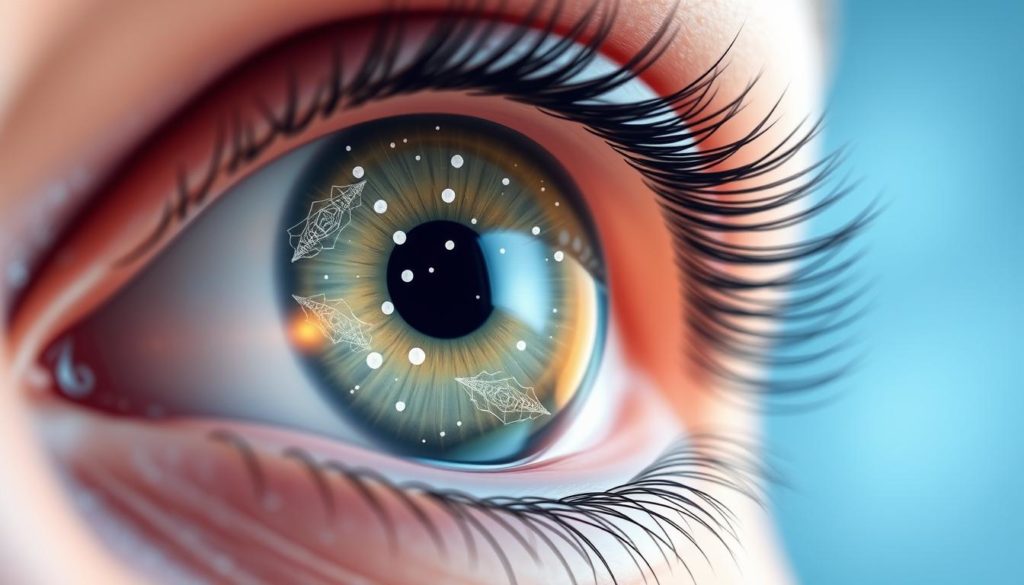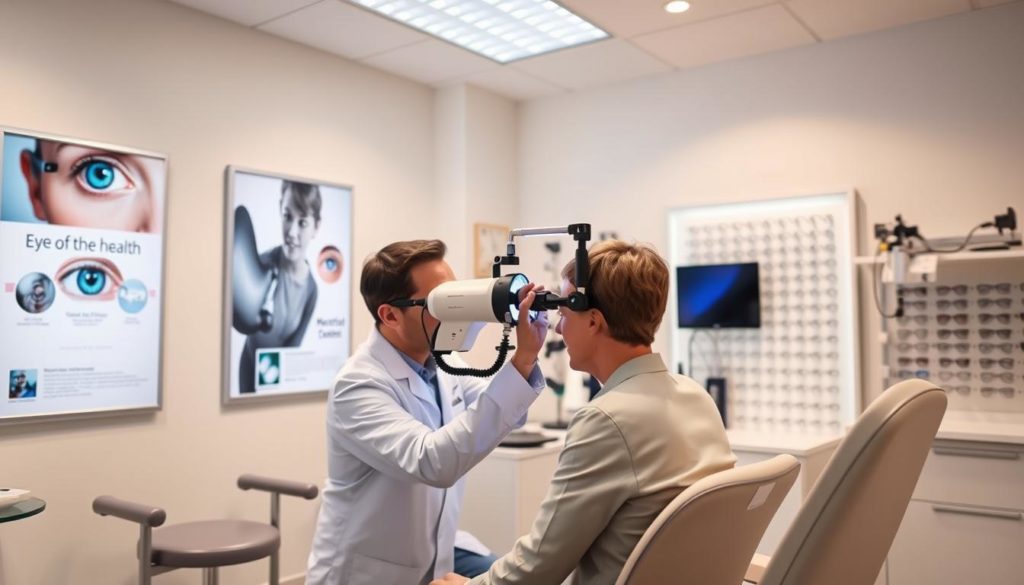Did you know that up to 76% of people over 50 have eye floaters? This common problem can be a minor annoyance or a big issue that affects daily life. Finding the best treatment for eye floaters is key for those looking to manage it well.
We’ll look at different ways to handle eye floaters, from natural methods to advanced surgery. If you’re looking to get rid of eye floaters or want to learn about different treatments, we’re here to help.
Understanding Eye Floaters: Causes and Symptoms
Eye floaters are small spots or squiggly lines that move in your vision. They can be interesting but also a bit scary. Let’s explore why they happen and how they show up.

Common Causes of Eye Floaters
Eye floaters can come from many reasons, showing how our eye health is. They often happen when the vitreous, the gel inside our eyes, changes. As we get older, this gel can turn liquid and pull away from the retina, causing floaters.
Other things like diabetic retinopathy, retinal tears, and eye inflammation can also cause them.
Symptoms Associated with Eye Floaters
The signs of eye floaters are pretty clear. They look like small shapes that move with your eyes. People might see them as dark specks, cobwebs, or threads.
They’re more noticeable against a bright, plain background like a clear sky or a white wall. While most of the time they’re harmless, seeing lots of them or flashes of light is a sign to see an eye doctor right away.
Consulting an Eye Specialist: When to Seek Help
Keeping your vision health in top shape is key. Knowing when to see an eye specialist can be a game-changer. Sometimes, eye floaters are just a minor annoyance. But other times, they might signal a bigger problem that needs a doctor’s care.
If you see more floaters than usual or flashes of light, it’s time to see an eye doctor. These signs could mean you have a serious issue like a retinal tear. This needs quick attention to avoid losing your vision.
Timely eye specialist consultation ensures that any serious conditions, such as retinal tears or detachments, are promptly addressed. Acting swiftly can significantly enhance your chances of preserving good vision health.
Eye doctors use many tests to figure out what’s going on with your floaters. They do detailed exams and use tools like ultrasonography. These tests help them find out why you have floaters and how serious they are. This info is crucial for creating a good treatment plan.

| Symptom | Action |
|---|---|
| Sudden increase in floaters | Seek immediate eye specialist consultation |
| Flashes of light | Immediate consultation needed |
| Gradual increase in floaters | Schedule regular consultation |
| Overall vision health check | Annual check-up |
By knowing when to get help, you can act fast to treat eye floaters. This helps keep your vision in great shape.
Natural Remedies for Eye Floaters
Looking for natural ways to deal with eye floaters can be very rewarding. Making changes in your diet, using herbal treatments, and adjusting your lifestyle can help a lot.
Dietary Changes to Improve Eye Health
One easy way to fight eye floaters is through eye health nutrition. Eating foods rich in vitamins A, C, and E, and omega-3 fatty acids is key. Add leafy greens, citrus fruits, nuts, and fatty fish to your diet to help your eyes fight off floaters.
Here’s a quick guide to eye-friendly foods:
| Food | Nutrient | Benefit |
|---|---|---|
| Spinach | Vitamin A | Prevents dryness and night blindness |
| Oranges | Vitamin C | Protects against cataracts and macular degeneration |
| Almonds | Vitamin E | Shields eyes from free radicals |
| Salmon | Omega-3 | Reduces risk of age-related macular issues |
Herbal Treatments and Supplements
Trying herbal eye supplements can also help. Herbs like bilberry, ginkgo biloba, and eyebright are good for the eyes. You can find these in teas, capsules, or extracts, helping to lessen floaters.
Lifestyle Modifications and Exercises
Changing your lifestyle and doing eye exercises can also help. Drink plenty of water, limit screen time, and sleep well. Eye exercises like focusing on distant objects, rolling your eyes, and blinking can improve your vision naturally.
Over-the-Counter Solutions for Managing Eye Floaters
Eye floaters can be annoying, but there are many over-the-counter solutions. These include eye drops and vitamins and supplements for eye health. Let’s look at what works and what benefits they offer.
Popular Eye Drops and Their Efficacy
Many eye drops claim to help with eye floaters. Brands like Systane, Refresh, and Bausch + Lomb offer these drops. They work by making your eyes feel better, but how well they work can differ for everyone.
| Brand | Active Ingredient | User Rating | Price Range |
|---|---|---|---|
| Systane | Polyethylene Glycol | 4.5/5 | $10-$15 |
| Refresh | Carboxymethylcellulose | 4.4/5 | $8-$12 |
| Bausch + Lomb | Hypromellose | 4.3/5 | $9-$13 |
Vitamins and Supplements for Eye Health
Eye health vitamins and supplements can also help. They include lutein, zeaxanthin, and vitamin C. These are good for keeping your eyes healthy and might make eye floaters less noticeable.
Here are some popular vitamins and supplements for eye floaters:
- Lutein and Zeaxanthin: These antioxidants are found in high concentrations in the retina and help filter harmful light.
- Vitamin C: Contributes to healthy blood vessels in your eyes and can slow the progression of eye floaters.
- Omega-3 Fatty Acids: Known to support retinal function and reduce inflammation.
While research is ongoing, adding these supplements to your diet may help your eye health.
Surgical Options for Eye Floaters
For those dealing with eye floaters, surgery can bring lasting relief. Two common surgeries are laser vitreolysis and vitrectomy. Each has its own benefits and risks.
Laser Vitreolysis: Procedure and Benefits
Laser vitreolysis is a quick, non-invasive way to treat eye floaters. It uses a laser to break them down. A big plus is the fast recovery time, allowing patients to get back to normal life quickly.
This procedure is also painless for most people. They see a big improvement in how clear their vision is.
Vitrectomy: Risks and Rewards
The vitrectomy procedure removes the vitreous gel from the eye. This gets rid of floaters for good. But, it’s not without risks.
Complications can include retinal detachment and infections. Still, many find the benefits worth it. Especially if the surgery is done by a skilled doctor.
Technological Advances in Treating Eye Floaters
Ophthalmology is moving forward fast, bringing new technologies for eye floater treatments. These new methods are not only more effective but also less invasive than old treatments. Let’s explore the latest breakthroughs and how they’re changing eye floater treatment.
Emerging Laser Treatments
Laser treatments for eye floaters are a big step forward. Laser Vitreolysis uses precise laser beams to break up floaters. This makes them less noticeable and less bothersome to your vision. It’s known for quick recovery times and little discomfort during the process.
- Precision: The laser targets floaters accurately without harming nearby tissues.
- Non-Invasive: It’s a safer option than traditional surgery.
- Quick Recovery: You can usually go back to normal activities soon after.
Innovative Non-Surgical Procedures
There are also new non-surgical treatments for eye floaters. These include using special drugs to dissolve or reduce floaters. Plus, there’s adaptive optics technology for clearer vision.
Diagnostic tools like Optical Coherence Tomography (OCT) give detailed eye images. This helps doctors create more precise and effective treatments:
| Technology | Benefits |
|---|---|
| Laser Vitreolysis | Targets and dissolves floaters with high precision and minimal discomfort |
| Pharmacological Agents | Non-invasive approach to dissolve floaters, reducing intrusions in vision |
| Adaptive Optics | Enhances clarity and reduces impacts of floaters on daily activities |
| Optical Coherence Tomography | Provides detailed imagery, allowing personalized and effective treatments |
These new technologies for eye floaters show a bright future. Patients will have more effective and less invasive treatments. This will greatly improve their quality of life.
Holistic Approaches to Reducing Eye Floaters
A holistic treatment for eye floaters offers a complete solution. It uses alternative medicine to improve vision and lower floater occurrence. This method looks at the body as a whole, aiming for balance and health through natural means.
There are many alternatives to traditional treatments. These include changing your diet, using herbal remedies, and making lifestyle changes. These methods help not just with floaters but also with eye health. Here are some key holistic strategies for eye floater management:
- Dietary Adjustments: Eating foods full of antioxidants, vitamins, and minerals helps eye health and might cut down on floaters.
- Herbal Supplements: Taking herbal supplements like ginkgo biloba and bilberry can improve eyesight and reduce floaters.
- Eye Exercises: Doing eye exercises regularly can make your eye muscles stronger and might lessen floaters.
Using these holistic strategies can help alongside traditional treatments. They offer a natural way to manage eye floaters. Adopting alternative medicine for eye health can lead to a more effective management plan. It ensures both eye and overall health.
Eye Floaters Treatment Options: Comparing Strategies
Eye floaters can really mess with your vision. There are many ways to treat them, from natural remedies to surgery. Knowing how well they work, how much they cost, and if insurance covers them is key.
Evaluating the Effectiveness of Different Treatments
Looking at eye floaters treatments, each has its own good and bad points. Natural remedies might help your eyes but take time. Surgery, like laser treatments, works fast but is riskier and pricier. Over-the-counter options are easy to get but might not last long.
Cost Considerations and Insurance Coverage
The treatment cost for eye floaters changes a lot depending on the method. Natural and over-the-counter treatments are cheaper, costing between $20 and $200. But, surgery can cost between $1,500 and $3,000 or more, based on the type and doctor.
It’s also important to know about insurance for eye floaters. Some plans might help pay for surgery, but rarely for natural or over-the-counter options. Always talk to your insurance to see what they cover.
| Treatment Option | Estimated Cost | Insurance Coverage |
|---|---|---|
| Natural Remedies | $20 – $200 | Rarely Covered |
| Over-the-Counter Solutions | $20 – $50 | Not Covered |
| Laser Vitreolysis | $1,800 – $2,500 | Partially Covered |
| Vitrectomy | $1,500 – $3,000 | Often Covered |
Preventative Measures for Eye Health
Preventing eye floaters is as important as treating them. Taking steps to protect your eyes can make a big difference. Here’s how to keep your eyes healthy:
Routine Eye Exams
Getting regular eye exams is key for good vision and spotting eye problems early. These exams check your eye health and find issues before they get worse. Most doctors say you should get an eye exam every year.
This is especially true for finding problems like glaucoma, cataracts, and retinal issues, including eye floaters.
Healthy Lifestyle Practices
Living a healthy lifestyle is great for your eyes. Eating foods rich in vitamins A, C, and E, omega-3 fatty acids, and zinc helps your eyes. Eating leafy greens, carrots, fish, and citrus fruits is good for your eyes.
Drinking plenty of water and exercising also helps your overall health. This reduces stress and strain on your eyes.
Wearing sunglasses to block UV rays and using good lighting when reading or using screens also helps. Avoiding smoking and not spending too much time in front of screens are also important for your eyes.
| Preventative Measure | Benefit |
|---|---|
| Regular Eye Exams | Early detection of eye issues |
| Healthy Diet | Nutrients for optimal eye function |
| UV Protection | Protection from harmful rays |
| Proper Lighting | Reduced strain on eyes |
| No Smoking | Lower risk of eye diseases |
Personal Stories: Experiences with Eye Floaters
Living with eye floaters can be tough, but hearing others’ stories helps a lot. Many people have dealt with these annoying visual issues. They’ve found ways to cope, like changing their diet and taking eye-friendly nutrients.
Some have tried natural remedies, like eating more Vitamin C and Omega-3 fatty acids. These changes can help without needing a doctor.
Others have chosen to get professional help. Laser vitreolysis is a treatment that uses lasers to break up floaters. It can make your vision better and help you live more easily.
Some patients have even had a vitrectomy, a more serious surgery. It’s risky, but many say it was worth it for clearer vision.
People have found many ways to deal with eye floaters. Some practice mindfulness or do special eye exercises. These stories show how people can adapt and find ways to live with floaters.
They also help people feel less alone. Whether it’s through natural remedies, medical treatments, or both, these stories offer hope.
FAQ
What are the best treatment options for eye floaters?
The best treatment for eye floaters depends on how bad they are and how they affect your vision. You can try natural remedies and lifestyle changes. Or, you might need over-the-counter drops, supplements, or even surgery like laser vitreolysis or vitrectomy.
What causes eye floaters?
Eye floaters often come from age-related changes in the eye’s vitreous. This leads to tiny clumps that cast shadows on the retina. Other causes include eye inflammation, bleeding, and retinal tears.
What symptoms are associated with eye floaters?
Symptoms include seeing small shapes or spots moving in your vision. You might also see shadows or dark spots. Some people see transparent or light-colored strings or webs.
When should I consult an eye specialist about my floaters?
See an eye specialist if you notice a sudden increase in floaters. Also, if you see flashes of light, lose peripheral vision, or have any vision changes. These could be signs of a serious issue like retinal detachment.
Are there natural remedies for eye floaters?
Yes, natural remedies can help. Try changing your diet to improve eye health. Herbal treatments and supplements can also help. Plus, eye exercises can make a difference.
What over-the-counter solutions are available for managing eye floaters?
Over-the-counter options include eye drops for better eye health. Vitamins or supplements that support eye function are also available. They might not get rid of floaters but can make your vision more comfortable.
What are the surgical options for treating eye floaters?
Surgical options include laser vitreolysis and vitrectomy. Laser vitreolysis uses a laser to break up floaters. Vitrectomy removes part or all of the vitreous. Each has its own risks and benefits, depending on your case.
What are some recent technological advances in treating eye floaters?
New laser treatments and non-surgical procedures are emerging. These aim to reduce the impact of floaters on your vision. They offer promising alternatives to traditional methods.
Can holistic approaches help reduce eye floaters?
Yes, holistic approaches can help. They include alternative medicine and lifestyle changes. These methods focus on eye health and reducing causes without traditional medicine.
How do different treatments for eye floaters compare?
Treatments vary in how well they work, cost, and how invasive they are. Natural remedies and over-the-counter solutions are less expensive and less invasive. But, they might not work as well. Surgical options offer better results but are more expensive and risky. Insurance coverage also varies.
What preventative measures can I take to maintain eye health?
To keep your eyes healthy, get regular eye exams. Live a healthy lifestyle and protect your eyes from strain and injury. Eating a balanced diet rich in vitamins and minerals good for your eyes can also help prevent floaters.
Are there any personal stories about experiences with eye floaters?
Many people share their experiences with eye floaters. They talk about how different treatments affected their vision and life. Their stories offer valuable insights and support for those facing similar issues.


